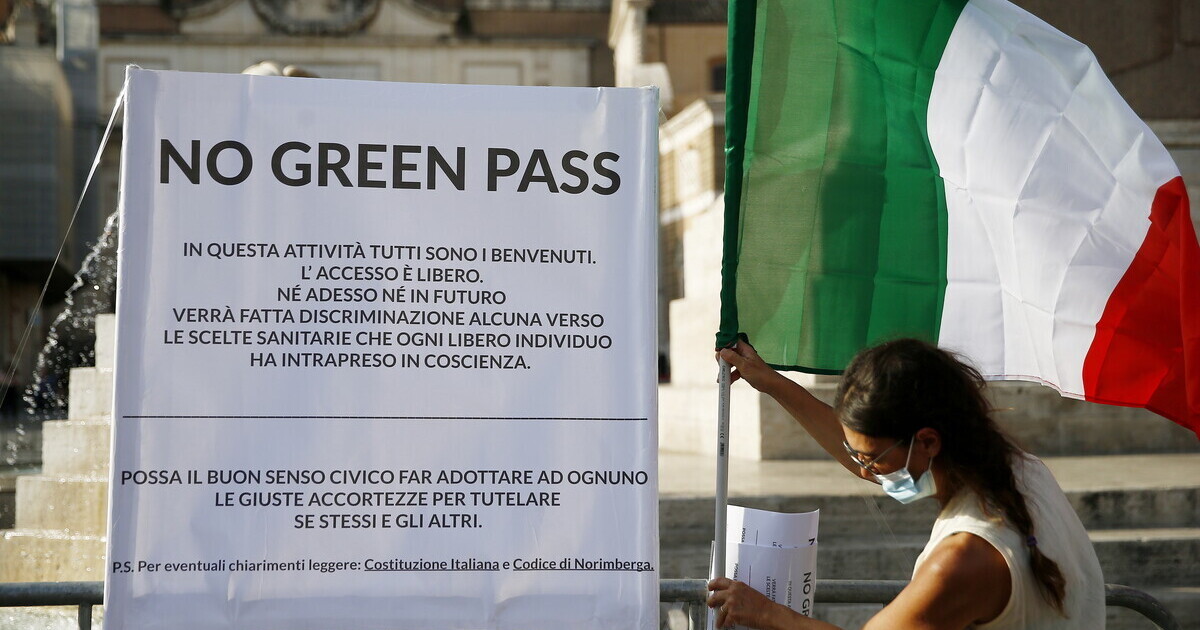One of the first actions of Italy’s new right-wing government will be to abolish mandatory covid vaccination and Covid passports, called green passport.
Despite her initial support for the health measures, Italy’s next prime minister, Giorgia Meloni, has long opposed mandatory vaccination and the introduction of the Covid passport and will put these issues on her agenda when she takes office.
“In line with what we wrote in the party program and with what we said during the election campaign, we are against the Covid passport and compulsory vaccination because we believe that this is not the way to deal with a health emergency,” explained Elisabetta Gardini, deputy of Fratelli, Meloni’s party, in the program 24 Mattino on Radio24.
In this sense, one of the first measures of the new right-wing government will be to repeal the decree of the previous prime minister that made vaccination compulsory for those over 50, for which thousands of Italians were fined last year, and also to abolish the health passport, which violates citizens’ rights.
“The coherence would be precisely to end this chapter. We believe that there is no passport and no obligation to vaccinate. Everything related to health care should be decided personally with the doctor and not with an obligation made by a bureaucrat,” added the congresswoman.
Gardini also said Meloni wants to set up a commission to investigate all the measures taken by the last two governments during the pandemic, that is, that of Socialist Giuseppe Conte and that of Socialist Mario Draghi.
The latter imposed a brutal quarantine and a health passport, respectively.
“We also want a commission to evaluate everything that has been done, both from an economic and a health point of view,” she said.
The quarantine caused millions of Italians to lose their jobs and many others to suffer health problems related to the dismantling of essential services.
As a result, forced vaccination and the green passport violated the constitutional rights of the entire population.
The new Italian right-wing coalition has taken shape with the appointment of the presidents of the two chambers: Ignazio La Russa, one of the founders of the Fratelli, in the Senate and Lorenzo Fontana, Salvini’s right-hand man in the Lega, in the Chamber of Deputies.
La Russa’s appointment was a bitter pill for Forza leader Silvio Berlusconi, who had agreed that he would lead the Senate. Meloni, however, wanted to maintain his majority and pushed through his right-hand man in the upper house.
The former prime minister called Meloni “condescending, opinionated, arrogant, and insulting,” For a moment, it looked as if the coalition would break up.
Even after il Cavaliere’s outburst, the next prime minister replied, “I am not blackmailable,” and the relationship remained in flames.
Fortunately, Berlusconi eventually reconciled with Meloni.
Rumor has it that the former president’s children had dinner with him Sunday night, bringing him to his senses. “Accept that you’re not in charge anymore,” one of his sons is said to have told him.
The next day, he traveled to Rome for a private meeting with Meloni, where they settled their differences.
On his Twitter account, he wrote: “I met with Giorgia Meloni in Rome. We are working together to give Italy as soon as possible a strong, cohesive, and profiled government that knows how to deal with emergencies immediately.”
He added: “For this reason, Fratelli and Forza Italia will appear together with the other forces of the coalition in the upcoming consultations with President Sergio Mattarella. During the meeting, we took stock of the priorities that must be tackled by the new government, starting with expensive energy.”
Despite being left without the Senate presidency, Berlusconi’s party will keep control of some ministries, according to the 8% obtained last Sept. 5.
Meloni, Salvini, and Berlusconi are currently negotiating intensively to draw up a list of ministers who will accompany Giorgia in the first purely right-wing government in the history of Italy.
Once the list of ministers, the heads of blocs, and other minor positions have been presented, the approval of President Sergio Mattarella is needed to confirm the new government, a figure who, despite having a rather ceremonial role, has the power to veto ministers and in the past has had an enormous influence on the composition of Cabinets.


